Quick Links
You might be surprised to learn that the only natural cleaning product you ever need again is the one you already have in your kitchen.
White Vine Vinegar!
Proper cleaning with white wine vinegar is not only easy and good for your wallet, but it helps keep millions of plastic bottles out of landfills and protects your and your children’s health.
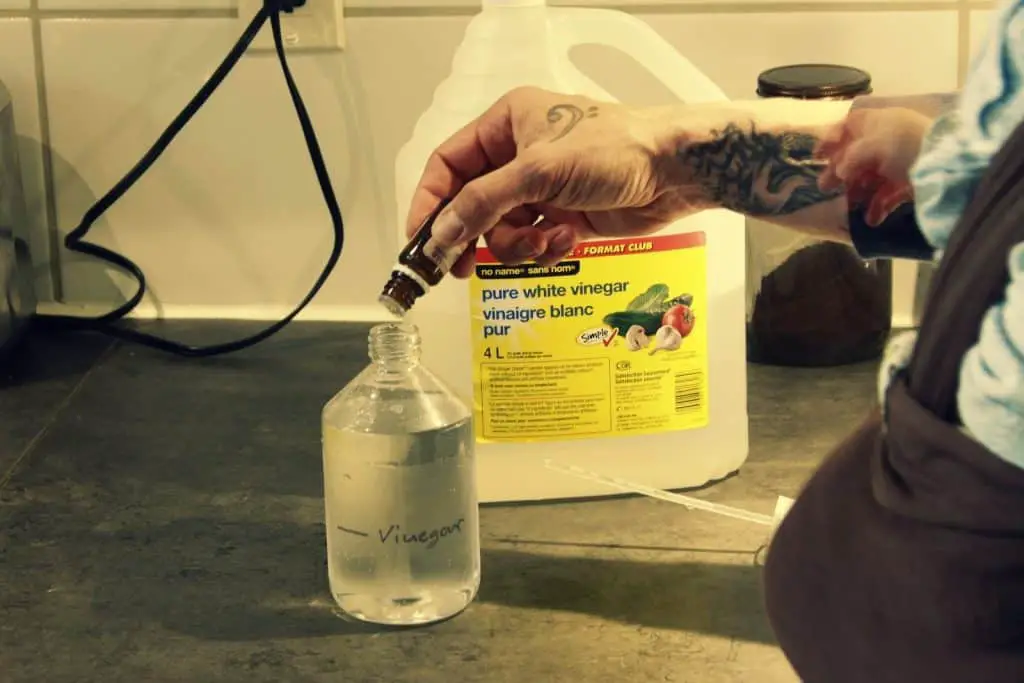
The magic portion keeps your house clean, fresh, and, best it is, safe around children and pets. (yep, that’s my daughter’s hand)
The more I learned about zero waste, the more I discovered companies trying to sell us unnecessary products. In this case, I am talking about cleaning products. We believe that we need XYZ to have a clean house. Clean your car with this and your toilet with that.
The worst part is that this stuff contains harmful chemicals you don’t want to get close to. Would you take a sip of bleach? So why do we use this stuff to clean even chopping boards sometimes?
All BS if you ask me.
Something I learned from trash is for tossers. Lauren Singer said you wouldn’t eat the products you clean your surfaces with. So why would you use harsh chemicals on surfaces that you; later prepare food on?
Related: the 20 best zero waste dish soap brands
Which zero waste cleaning product do I need?
That is an easy answer. You need:
- Distilled white wine vinegar
- Water
- Essential oil (optional)
- Bicarbonate soda (optional)
The tools to get the job done:
You will need a towel and a bucket and these.
1. Swedish Dish Cloth
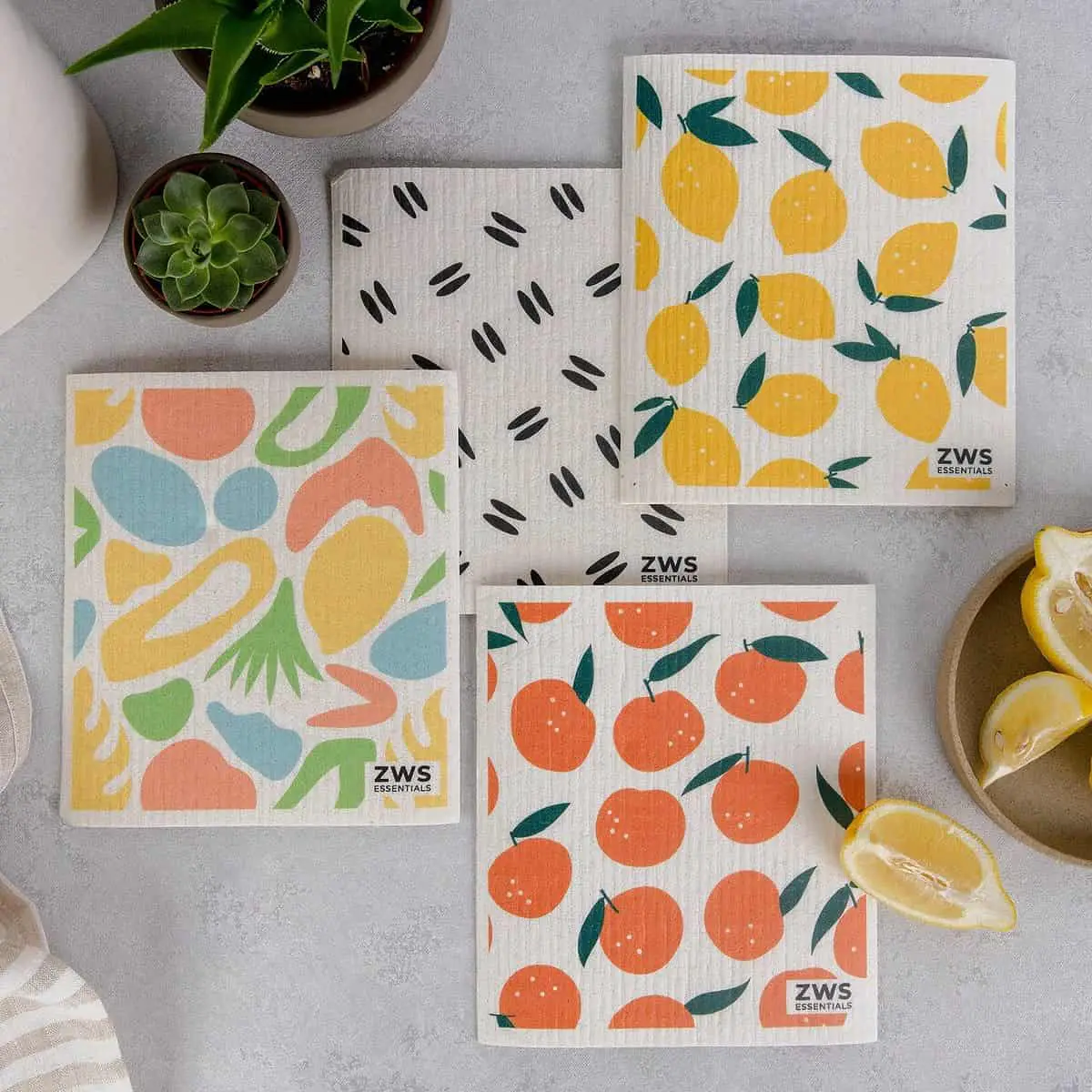
Embrace eco-friendliness with the Zero Waste Sponge Cloth from ZWS Essentials. This efficient Swedish dishcloth absorbs 20 times its weight in liquid, replacing 17 rolls of paper towels. The quick dry feature eliminates any ‘damp’ smell, keeping your kitchen fresh. The best part? It’s compostable! After serving you for 6-12 months or up to 200 wash cycles, it’ll disintegrate naturally in your compost pile.
Price: $4. 19
2. Coconut Scrub
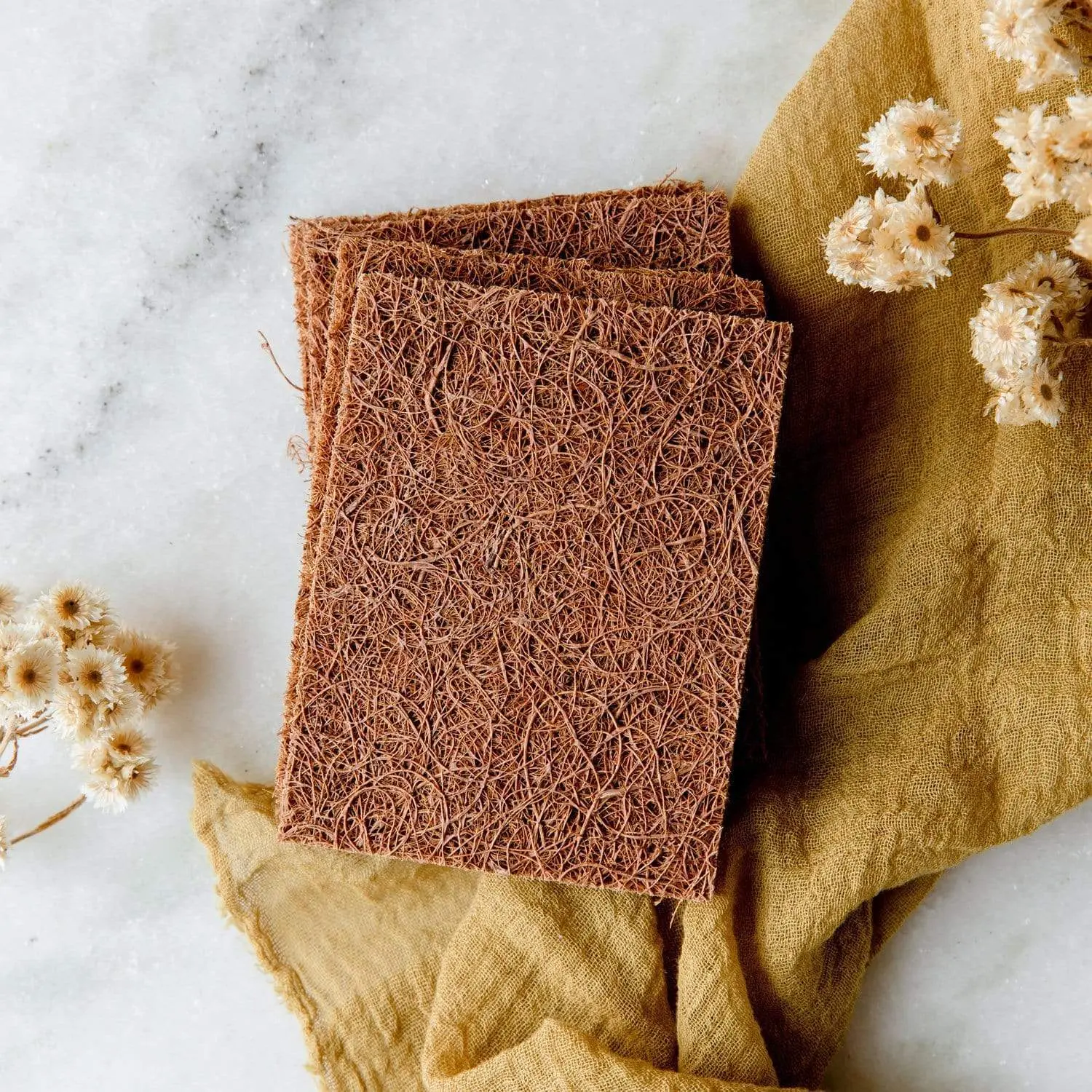
These zero-waste heroes replace plastic in kitchens, offering tough, scratch-free cleaning without damaging kitchenware. Crafted from waste coconut coir and natural rubber latex, their long-lasting impact goes beyond their lifespan.
Post use, they can be composted at home, buried, or added to a food waste bin, depending on local facilities.
Price: $5.59 for 5 sponges
Related: The 9 Best Eco-Friendly Dish Brushes To Replace Your Plastic Habit
Vinegar and bicarb
We only combined bicarb and vinegar when we had a blocked sink. We use 1/2 a cup of bicarb, pour it down the drain, and 1 cup of vinegar. Enjoy the show. I get quite a satisfaction out of watching the two react.
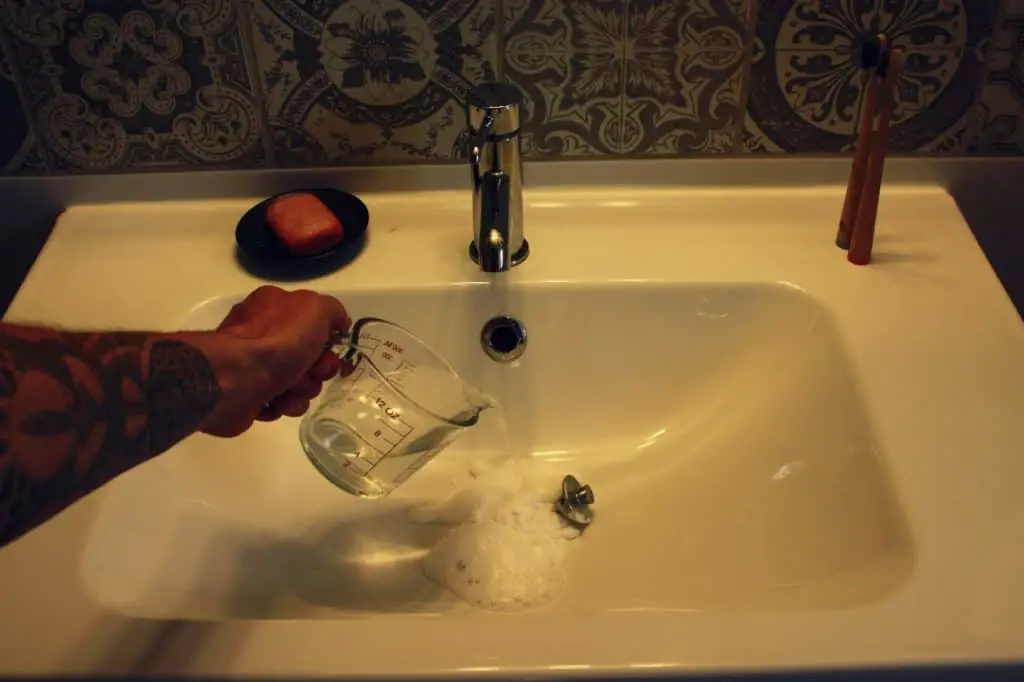
Once they have bubbled, you can run hot water down the drain to flush it out. However, sometimes you may need to redo this process until your drain is free again. But still 100 x better than pouring harsh chemicals down there.
Remember, this will go straight into the ocean. You wouldn’t want to eat fish that swam in that stuff, would you?
Related: 21 Essential Swaps for a zero waste bathroom
Another use we have for it is to soak our reusable diapers in them. After using them for half a year, we noticed that they did start to smell, and the best solution was to throw them in a bucket with bicarb and vinegar and water and let them soak. Perhaps we don’t need to add the bicarb. I will do a test and let you know.
What ratio does my zero waste cleaning product need?
Usually, the most common one we do at home, which I have found during my research, is the 50/50 ratio.
Fifty parts of water and 50 parts of distilled white wine vinegar. It is important to use white wine vinegar since apple cider vinegar doesn’t clean. Jokes only use white wine vinegar, please.
Optionally you can use some essential oil and dribble 15-20 drops. I use tea tree oil and love the smell, but any oil works.
Should I clean my produce with white wine vinegar?
The simple answer to this question is yes.
By the time the fruit has reached your kitchen basket, it has gone through many hands and most likely has been sprayed, and this residue might not be washed off from just rinsing your fruit under the tap.
Your best practice is to make a 3/1 part solution of vinegar water (3 parts of water/ 1 part of vinegar) and soak your fruit there for 10 minutes. This will kill bacteria and even viruses the natural way. Please don’t wash your fruit in soap as it will absorb it. You may blow bubbles after eating an apple; funny but perhaps not so healthy :).
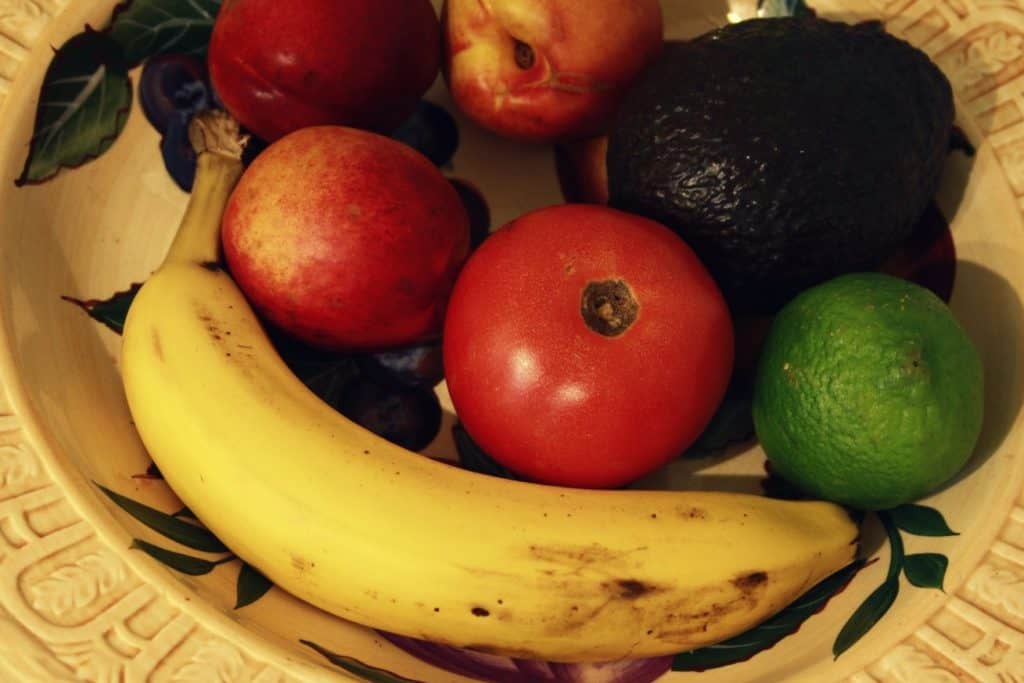
Rinse with water and let it dry.
P.s.: Cleaning your produce in white wine vinegar is an excellent way to prevent fruit flies from entering your kitchen. As I have learned on the ELT podcast. Did you know that we invite them into our home from the supermarket? That’s where the fruit fly lays its eggs, and when they hatch, they call our kitchen their new home.
Items to clean with vinegar and water solution 1
- Countertops non-stone: use a spray bottle and wipe off excess.
- Flooring: Use a cup of vinegar in a gallon of warm water and mop as usual.
- Cabinetry: spray and let sit for a couple of minutes. Be careful as it may damage some wooden surfaces.
- Shower and bathtubs: spray bottle and cloth.
- Toilet: spray bottle and cloth
- Walls and doors: spray bottle and cloth. The ratio can be less than vinegar.
- Windows: window cleaning experts suggest cleaning the window when the sun isn’t shining to avoid streaks. Wipe off dust, and then spray your 1/1 ratio on the window.
- Upholstery: spray the affected area and wipe off the dirt. Ad essential oil for better-smelling furniture
- Appliances
- Dishwasher: cleaning with vinegar: run a cup of vinegar through a short cycle. This will remove any build-up of dishwashing liquid. and limescale
- Oven: spray and wipe with 1/1
- Fridge: spray and wipe with 1/1
- Cleaning your Coffee maker with white vinegar: run a 1/1 water and vinegar solution through your coffee machine to eliminate mold, hard water accumulations, and odors.
- Cooking tools: Have you noticed how your Tupperware takes on the color and odor of the food they hold? This is because plastic is very porous and absorbs the oil in the food. Soaking the item in a vinegar and water solution effectively removes stains and eliminates odors without damaging them. You should avoid boiling water when cleaning plastic, as the surface can warp or leach toxic chemicals.
- Clothing: over time, clothes can change how they feel, possibly due to the detergent you use. An easy solution is to soak your garments in warm water in the bathtub and add a bit of white wine vinegar overnight. This will remove the soap detergent making your clothes feel soft and new again.
- Optionally, we recommend using Tru Earth washing detergent as it is the only total zero waste washing detergent and is suitable for your clothes and the environment. Well not the only ones anymore; check out the review we have written about Earth Breeze Laundry Strips
Related: Eco-friendly pest control
What not to clean with white vinegar:
Marble and granite. The acidity of the vinegar will eat away at these surfaces.
- Stone surfaces, like a granite countertop or slate tile floor;
- Solid wood furniture;
- Hardwood flooring, unless they have confirmed that it will not damage the finish;
- Electronics, like computers or smartphones;
- Egg spills because the acid causes the eggs to thicken and become difficult to remove;
Alright, there you have it. It is about getting to work and keeping your home and car sparkly clean, and safe for your kids. If you have any questions, leave me a comment below.
If you want to learn more zero waste tips and tricks, check out my Youtube channel:

